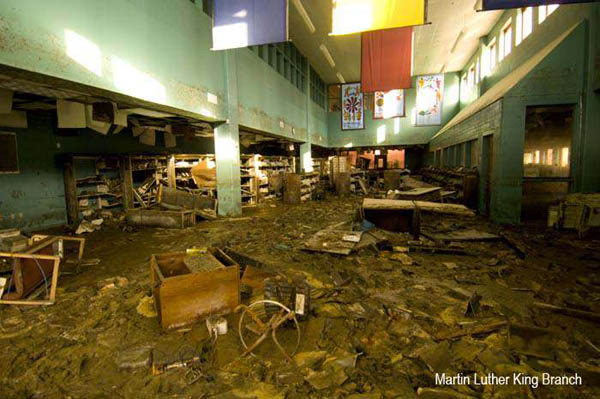
Recently in New Orleans, I was working at AAUP‘s annual meeting of university presses. At the opening banquet, Times-Picayune editor Jim Amoss brought a large audience of publishing folk through a blow-by-blow of New Orleans’ storm last fall. What I found particularly resonant in his recount, beyond his staff’s stamina in the face of “the big one”, was the Big Bang phenomena that occured in tandem with the flooding, instantly expanding the relationship between their print and internet editions.
Their print infrastructure wrecked, The Times-Picayune immediately turned to the internet to broadcast the crisis that was flooding in around them. Even the more troglodytic staffers familiarized themselves with blogging and online publishing. By the time some of their print had arrived from offsite and reporters were using it as currency to get through military checkpoints, their staff had adapted to web publishing technologies and now, Amoss told me, they all use it on a daily basis.
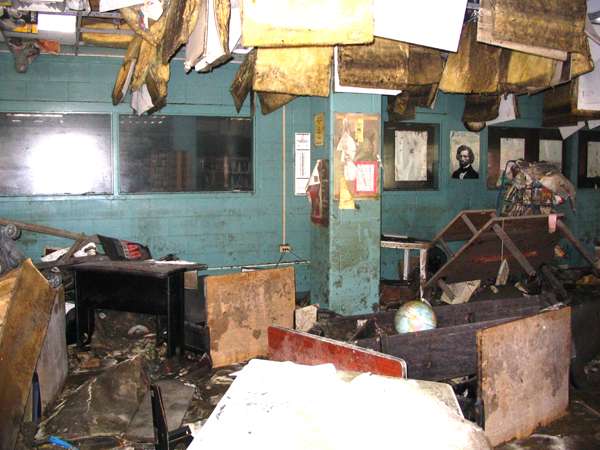
Martin Luther King Branch
If the Times-Picayune, a daily publication of considerable city-paper bulk, can adapt within a week to the web, what is taking university presses so long? Surely, we shouldn’t wait for a crisis of Noah’s Ark proportions to push academe to leap into the future present. What I think Amoss’s talk subtly arrived at was a reassessment of *crisis* for the constituency of scholarly publishing that sat before him.
“Part of the problem is that much of this new technology wasn’t developed within the publishing houses,” a director mentioned to me in response to my wonderings. “So there’s a general feeling of this technology pushing in on the presses from the outside.”
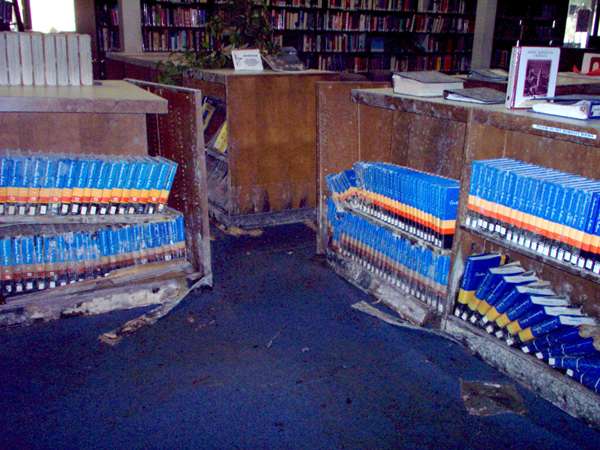
East New Orleans Regional Branch
But “general feeling” belies what were substantially disparate opinions among attendees. Frustration emanated from the more tech-adventurous on the failure of traditional and un-tech’d folks to “get with the program,” whereas those unschooled on wikis and Web 2.0 tried to wrap their brains around the publishing “crisis” as they saw it: outdating their business models, scrambling their workflow charts and threatening to render their print operations obsolete.
That said, cutting through this noise were some promising talks on developments. A handful of presses have established e-publishing initiatives, many of which were conceived of with their university libraries. By piggybacking on the techno-knowledge and skill of librarians who are already digitizing their collections and acquiring digital titles (librarians whose acquisitions budgets far surpass those of many university presses,) presses have brought forth inventive virtual nodes of scholarship. Interestingly, these joint digital endeavors often explore disciplines that now have difficulty making their way to print.
Some projects to look at:
MITH (Maryland); NINES (scholar driven open-access project); Martha Nell Smith’s Dickinson Electronic Archives Project; Rotunda (Virginia); DART (Columbia); Anthrosource (California: Their member portal has communities of interest establishing in various fields, which may evolve into new journals.)
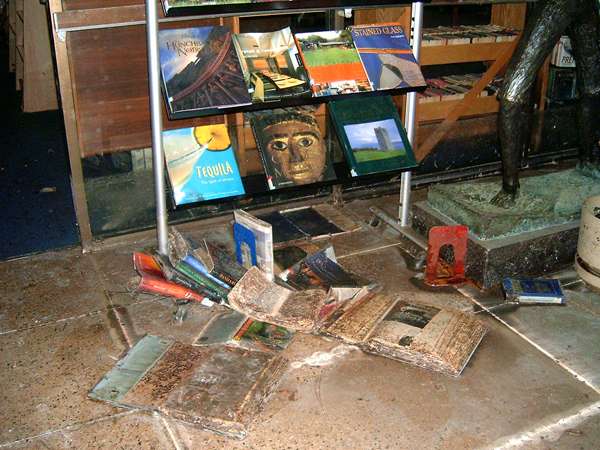
East New Orleans Regional Branch
While the marriage of the university library and press serves to reify their shared mandate to disseminate scholarship, compatibility issues arise in the accessibility and custody of projects. Libraries would like content to be open, and university presses prefer to focus on revenue generating subscribership.
One Digital Publishing session shed light on more theoretical concerns of presses. As MLA reviews the tenure system, partly in response to the decline of monograph publication opportunities, some argued that the nature of the monograph (sustained argument and narrative) doesn’t lend itself well to online reading. But, as the monograph will stay, how do presses publish them economically?
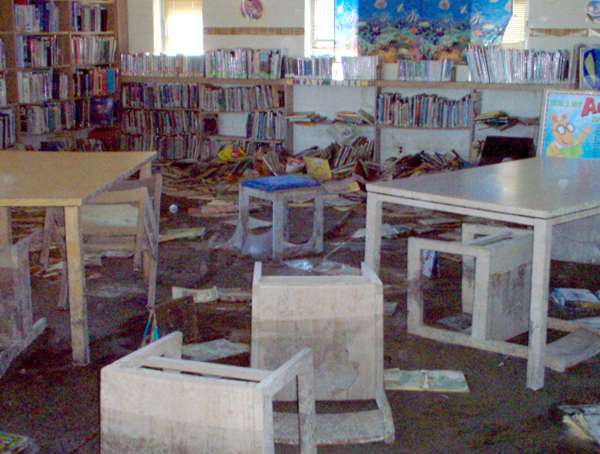
Nora Navra Branch
On the peer review front, another concern critiqued the web’s predominantly fact-based interaction: “The web seems to be pushing us back from an emphasis on ideas and synthesis/analysis to focus on facts.”
Access to facts opens up opportunities for creative presentation of information, but scholarly presses are struggling with how interpretive work can be built on that digitally. A UVA respondant noted, “Librarians say people are looking for info on the web, but then moving to print for the interpretation; at Rotunda, the experience is that you have to put up the mass of information allowing the user to find the raw information, but what to do next is lacking online.”
Promising comments came from Peter Brantley (California Digital Library) on the journal side: peer review isn’t everything and avenues already exist to evaluate content and comment on work (linkages, citation analysis, etc.) To my relief, he suggested folks look at the Institute for the Future of the Book, who are exploring new forms of narrative and participatory material, and Nature’s experiments in peer review.
Sure, at this point, there lacks a concrete theoretical underpinning of how the Internet should provide information, and which kinds. But most of us view this flux as its strength. For university presses, crises arise when what scholar Martha Nell Smith dubs the “priestly voice” of scholarship and authoritative texts, is challenged. Fortifying against the evolution and burgeoning pluralism won’t work. Unstifled, collaborative exploration amongst a range of key players will reveal the possiblities of the terrain, and ease the press out of rising waters.
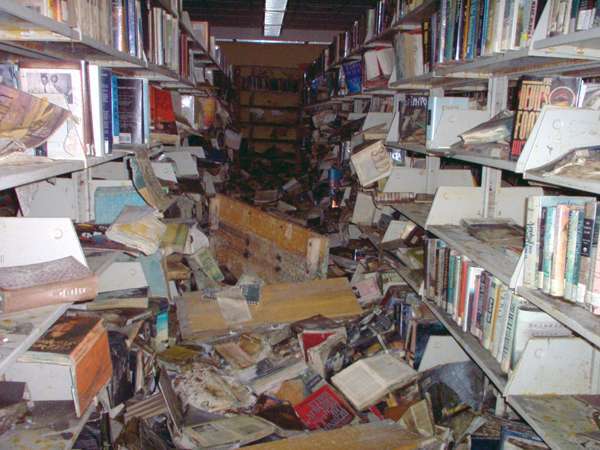
Robert E. Smith Regional Branch
All images from New Orleans Public Library
if:book
A Project of the Institute for the Future of the Book

ok, first, a reminder from reality-land.
a.a.u.p. is one of the organizations that has
_sued_ google over its digitization project.
once they have corrected that atrocity,
_then_ we can discuss things with them.
until then, though, they’re enemy #1…
-bowerbird
Thank you for the report & especially the images – v.deep — its good to have some pointers to people/places that are trying to think through how this might develop. The whole net publication vs. peer review print publication is a real juggernaut in these academic institutions. Similar to the issue referred to earlier regarding digital PhD dissertations.
i have been informed that a.a.u.p. is
_not_ a party to the suit against google.
they wrote a letter opposing the project,
one that was highly publicized, but they
did not join the suit.
i apologize for the factual error…
-bowerbird
Yes, in reality land, they’re not included in the suit. There’s a newsletter here where some uni press colleagues are airing their opinions on copyright.
Nice work, Sally. Thought I’d also point you toward the Ecclesiastical Proust Archive. It tracks every reference to churches in A la recherche du temps perdu and pairs them with visual depictions of the actual churches. This is very good for some people and absolutely useless for others, but still …
http://web.gc.cuny.edu/english/proustarchive/index.html